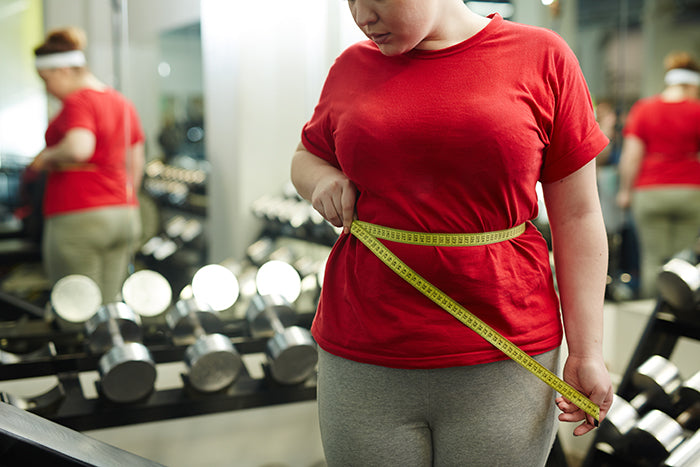You wake up in the morning, jump onto the scales, and - you’ve put on weight.
How did this happen?
It feels like no matter what you do, the weight keeps piling on. You begin to berate yourself for having that lunchtime latte, a slice of birthday cake, or an extra helping of fries.
But don’t worry, you’re not alone and the fact is that being overweight isn’t a reason to feel guilty or ashamed - everyone’s weight fluctuates from day to day.
However, it can be a sign that you need to change your lifestyle and eating habits. So for those looking to make a positive change in their life, taking control of your weight will go a long way towards that goal.
If the scales are showing a higher number than usual or your clothes are feeling a little tighter, you might be worried about the extra weight’s impact on your health.
And given that the Centers for Disease Control and Prevention published a study suggesting that obesity was responsible for 400,000 deaths yearly, it’s understandable why.
Despite the warnings and campaigns, obesity is still at an all-time high, with 36.2% of the U.S. population falling into the obese category. And the World Obesity Federation predicts that one billion people globally, including 1 in 5 women and 1 in 7 men, will be obese by 2030.
So, is being overweight or obese really bad for your health?
In this blog, we’re exploring the facts behind the claims that obesity is the nation’s biggest killer to help you understand whether it’s essential for you to embark on a weight loss journey.
How do I know if I’m overweight or obese?
What does it mean to be overweight?
We’re talking about clinical terms here, as it’s easy to be critical of our own bodies (even when we are perfectly healthy).
What it means to be overweight or obese will vary from person to person, depending on your height and body composition.
For example, two people could weigh the same, but one might be overweight, and the other might not (as they are different heights or have different body compositions). So ‘weight’ alone is not enough to determine whether you’re overweight.
Using BMI (Body Mass Index) to calculate your weight…

One of the ways that medical professionals determine whether you are overweight or not is by using the BMI scale (Body Mass Index).
It’s a calculation of height and weight, with the formula being:
weight in kilograms divided by the square of height in meters
You can download a BMI calculator from the CDC website and figure out what your BMI is. The BMI ranges then fall into different categories: underweight, healthy, overweight, and obese.
|
The average weight of women in the US according to age:
Ages 20-39: 167.6 pounds
Ages 40-59: 176.4 pounds
Ages 60 and up: 166.5 pounds
BMI ranges:
Underweight: under 18.5
Healthy: 18.5 to 24.9
Overweight: 25 to 29.9
Obese: 30 or higher
|
BMI is still widely used and is a good indication of whether someone is severely over or underweight, however, it’s not always accurate.
For example, two women at 5ft 4inches could weigh 174lbs, putting them in the overweight category according to BMI. But, one could be a weight-lifter with a lot of muscle mass (muscle weighs more than fat), meaning that their BMI category might not be reflective of their actual body composition and fat distribution.
So while, as a clinical tool BMI can be relevant and correct, in many cases, it misses essential factors such as genetics, lifestyle, age, and gender and should only be used as a guide.
So while it’s important to take your BMI into consideration it should be used as one part of understanding your overall weight and health. Other ways that you can determine whether you are overweight or not is by using:
- Fat measurement scales
- Size measurements
- How your clothes feel

This will give you a fuller picture of whether you are truly overweight or obese.
Is being overweight bad for my health?
There have been numerous studies that have concluded that being overweight does increase your risk of certain diseases - with the CDC suggesting that obesity was responsible for 400,000 deaths per year.
There are certain illnesses and diseases that seem to go hand-in-hand with obesity including
- Various types of cancer (including bowel and breast)
- Heart disease
- High blood pressure
- High cholesterol
- Fertility issues
- Diabetes

Plus there is some evidence to suggest that being overweight or obese can impact your mental health.
A study highlighted in the European Heart Journal showed that even being slightly overweight can increase your risk of heart disease by 28 percent, even for those with normal blood pressure, blood sugar, and cholesterol levels.
So, it can’t be ignored that weight and BMI do seem to be significantly linked to potential health issues. And if you want to be at optimal physical health and fitness, then you might have to ensure that your weight is within a healthy range - although this will differ from person to person.
If you are unsure about your weight or well-being then we advise you to consult a Doctor or health professional.
What are the other benefits of losing weight?
Of course, being overweight is not just about physical health; there are many reasons to lose weight that have nothing to do with appearance.
And for many people losing weight comes down to reasons other than physical health including
- Feeling confident in how you look and feel
- Increased energy
- An increased positive mental attitude

Ultimately if losing weight makes you feel better about yourself, then it’s worth doing it, whether it impacts your physical health or not.
Is it okay to be overweight?
It’s all been a bit doom and gloom so far, and you might feel a little concerned about your weight.
But what if you are happy with your appearance, even if you fall into the overweight or obese category?
If you’re happy, you have a BIG head start. Being happy significantly impacts our overall health, and we tend to eat healthier, be more active and sleep better. Happiness leads to healthier behaviors, which means if you want to lose weight for health reasons, you are far more likely to see it through and reach your goals.
Of course, we shouldn’t ignore the issues caused by being seriously underweight, which can also cause health issues such as malnutrition, osteoporosis, decreased muscle strength, hypothermia, and lowered immunity.
Social media portrays an image of the “perfect body”, which has led to people feeling shame about their body if it doesn’t conform to society’s expectations and standards. However, this “fat shaming” can be harmful to health and may in fact contribute to weight gain - as well as mental stress.
The “health at any size” movement encourages people to develop positive habits, such as putting more thought into meals, sleep patterns, and exercise. And while it’s important to be aware of the health risks associated with being overweight or obese, it’s important to try and live your healthiest life regardless of your weight or BMI.
If you want to lose weight you ultimately need to do it for the right reason, and the most important person in your life - YOU!
Whether you want to feel your best or feel like your old self again, there are many reasons to want to lose weight - all of which are totally valid and are not always have to do with health.

How to make lifestyle changes that will help you lose weight
When making changes in our lives, our brain often pushes the “panic” alarm, but rest assured, even minor changes can help you transform your life and your weight.
A little goes a long way and making a few small changes in some regions of your life can make a BIG difference.
1. Increase your water intake…

Water is essential for helping the body’s fat-burning process and also helps to reduce cravings for sweet and processed foods.
We don’t suggest you drink pints of water all in one go, but instead, go for the “little and often” method.
A little-known trick is to drink two cups of water before each meal. A study has shown that this can help aid weight loss by tricking your stomach into thinking it’s fuller sooner.
2. Move around more often…
Okay, this is a polite way of avoiding the “E” Word, but yes, exercise is what we’re referring to.
However, we’re not talking about sweating it out at the gym for hours (unless you want to) but finding movement that works for you.
This might include parking further away from the shops, standing instead of sitting or cleaning the house. There are lots of ways that you can introduce movement into your life that don’t have to involve traditional exercise.
Related content: HIT vs LISS: what’s the difference?
3. Choose the correct diet for you…
Finding the right diet for you is essential - otherwise, it won’t be sustainable and any weight you do lose will pile right back on when you stop.
Dieting can often leave you feeling hungry, but this doesn't have to be the case - and you can do it in small stages.
- Swap your high-calorie snacks for some healthier ones
- Prepare meals and snacks in advance
- Home cook your meals rather than eating out/ready-meals
Your diet doesn’t have to be perfect 100% of the time, but small changes can make a huge difference to your overall diet.
5. Making a list
Mindset is perhaps the most challenging part of sticking to a weight-loss plan. Your brain will be hellbent on throwing up reasons not to stick to your diet - so it’s a good idea to have techniques in place to remind yourself.
Write down a list of reasons why you want to lose weight. These might include:
- Look and feel better
- Have more energy
- Increased quality of life
- Better health
These are your ‘whys’ and they are what will keep you going on your weight loss journey even when you don’t want to.
So, do you need to lose weight if you are overweight or obese?
There are plenty of reasons not to be overweight including health concerns, but your own happiness and confidence should be at the center of any decision to lose weight. If you are losing weight because you think you have to, or because someone else told you to - then you likely won’t stick to any lifestyle changes (and you definitely won’t enjoy it).
Luckily even a few positive alternations to your diet and lifestyle can go a long way toward your weight loss goals. And ultimately if regulating and maintaining your weight makes you happy, your health will benefit.
Related: 6 tips for staying motivated to reach your weight loss goals




